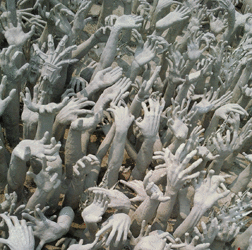The Jew of Malta
Fourth Monkey’s production of The Jew of Malta does come perilously close to souring things, but before we tackle that…

The Jew of Malta is the third and final part of the Marlowe450 series of plays, celebrating the 450th anniversary of Christopher Marlowe’s birth in his home town and, while the second instalment (The Massacre at Paris) took place in Canterbury Cathedral, this is in the more conventional setting of the Marlowe Studio.
However, as we have seen in this group’s previous work, Fourth Monkey is not content to play it safe, and has built an impressive scaffold structure that acted as city wall, nunnery, mansion and a variety of other locales.
The Jew of Malta is the lightest of the three Marlowe plays tackled during this short season (the first being Doctor Faustus) and the cast and director Justin Audibert draw every bit of comedy that they can from the script.
Much of that comes from Adam Trussell playing the titular Jew, Barabas. Carrying the performance with his mastery of a particularly loquacious character, Trussell is a reliable anchor for the entire play.
Another standout is Ami Syers as Ferneze, the Governor of Malta. Rarely do you get to see such a refined study of smugness and passive aggression.
Across the board, however, it’s wonderful to see players who had smaller roles in the two previous productions break out and inhabit larger characters.
So, on to the accents…
The "Shakesperean" voice is thankfully no longer a necessity in theatre, despite most theatre companies’ choice to stick with it. But when that standard is deviated from there does still need to be some consistency.
Here we have Scottish brogues, an odd transatlantic twang and estuary English mixing with more traditional deliveries, and the result is unpleasing to the ear.
They may be the cast’s own accents – it’s hard to say – but whatever it is, it’s a strange decision and one that gives an imbalance to some scenes. Especially when the rest of the production is so slick and precise.
Ultimately, the strength of the central performances, the strong direction and the space and respect given to Marlowe’s script make sure the production is kept under control.
In this trilogy of Marlowe plays, Fourth Monkey has shown that it is a company to keep an eye on. Among its number are some hugely talented actors and directors, willing to tackle difficult terrain and able to breathe new energy into plays that are very easy to play it safe with.
I hope to see more of them in the near future.










